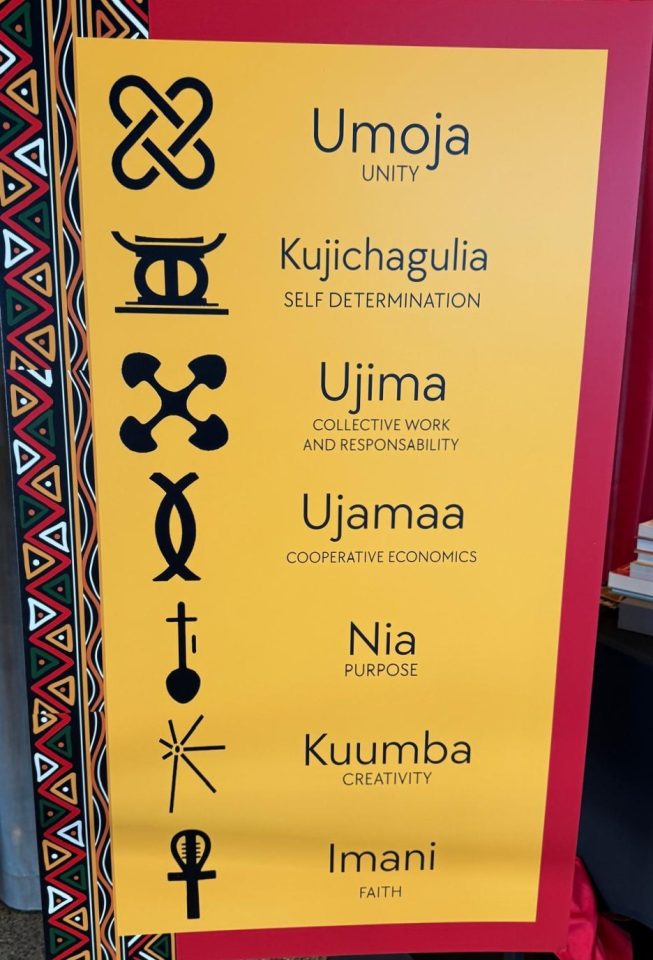Kwanzaa stands as a strong celebration of African American tradition, group energy, and familial bonds. This week-long observance, held from December twenty sixth to January 1st, represents greater than only a vacation – it embodies a dedication to cultural preservation and group empowerment. Created in 1966 by Dr. Maulana Karenga, professor of Africana research, Kwanzaa attracts inspiration from first harvest celebrations throughout Africa whereas establishing its personal distinctive cultural significance.
The inspiration of Nguzo Saba
The seven ideas of Kwanzaa, generally known as Nguzo Saba, type the celebration’s philosophical core. Every day focuses consideration on a selected precept that guides private development and group growth. These ideas present a framework for each celebration and each day dwelling all year long.
Umoja, that means unity, opens the celebration by emphasizing the significance of togetherness in household, group, and race relations. This precept encourages individuals to look past particular person considerations and take into account the collective well-being of their group.
Kujichagulia follows, selling self-determination and private company. This precept encourages people to outline themselves slightly than accepting externally imposed definitions. It emphasizes the significance of cultural id and autonomous decision-making.
Ujima introduces collective duty, instructing that group issues require group options. This precept transforms particular person challenges into shared considerations, fostering a spirit of mutual help and cooperation.
Financial and purposeful ideas
Ujamaa addresses cooperative economics, emphasizing the significance of constructing and sustaining community-owned companies. This precept encourages financial self-reliance and collective prosperity by means of shared enterprise possession and help.
Nia focuses on goal, significantly in constructing and growing the group. This precept connects particular person actions to collective development, encouraging purposeful work that advantages your entire group.
Inventive and religious parts
Kuumba celebrates creativity as a pressure for group enchancment. This precept encourages innovation and creative expression whereas emphasizing the duty to reinforce group life for future generations.
Imani concludes the celebration by specializing in religion – not simply spiritual religion, however perception in individuals, management, and the justice of the group’s battle for development. This precept strengthens group bonds by means of shared confidence in collective functionality.
Symbolic representations
Kwanzaa’s wealthy symbolism carries deep cultural significance. The mkeka, a woven mat, gives the inspiration for all different symbols, representing the historic basis upon which the group builds. The kinara, holding seven candles, symbolizes the unique stalk from which all individuals of African descent emerged.
The mishumaa saba contains seven candles representing the ideas: three pink candles symbolizing battle, one black candle representing the individuals, and three inexperienced candles representing the long run and hope. Collectively, these candles illuminate the ideas and path ahead.
Further symbols embrace:
- Mazao (crops) representing collective labor’s rewards
- Muhindi (corn) symbolizing kids and future prospects
- Kikombe cha Umoja facilitating unity by means of shared celebration
- Zawadi encouraging significant gift-giving targeted on development
Trendy celebrations
Up to date Kwanzaa celebrations mix conventional parts with fashionable expressions of African American tradition. The karamu feast, held on December thirty first, brings communities collectively for shared celebration by means of meals, music, and cultural expression.
Conventional celebrations usually embrace:
- African drumming connecting individuals to cultural roots
- Storytelling preserving historic information
- Libation ceremonies honoring ancestors
- Group discussions exploring precept purposes
- Cultural performances celebrating heritage
Up to date relevance
Kwanzaa maintains sturdy relevance in as we speak’s society, providing alternatives for cultural connection and group strengthening. The ideas tackle fashionable challenges whereas preserving conventional values, making the celebration significant for up to date individuals.
The celebration encourages:
- Cultural satisfaction and understanding
- Household bonds and group connections
- Financial empowerment methods
- Private growth and development
- Intergenerational information switch
Shifting ahead
As communities proceed celebrating Kwanzaa, its ideas present steerage for addressing present challenges whereas sustaining cultural connections. The celebration affords alternatives for reflection, group constructing, and cultural affirmation that reach past the seven-day observance.
By means of embracing Kwanzaa’s ideas and practices, individuals strengthen their understanding of African heritage whereas constructing stronger communities for future generations. The celebration continues evolving, sustaining its relevance whereas preserving its core mission of cultural affirmation and group empowerment.
